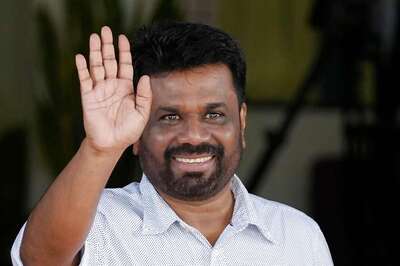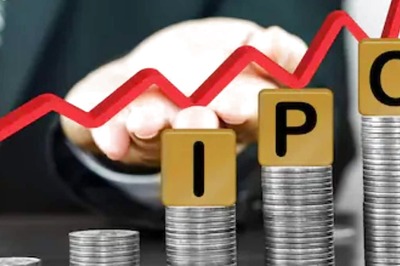
views
The world is in the grip of an unprecedented health crisis, which has also brought in its wake a never-before-seen economic emergency. Strict social distancing norms across most countries have led to a near standstill in economic activity. India, which was already in the grip of a prolonged economic slowdown even before COVID-19 arrived, is now witnessing added misery.
As the Centre grapples with economic challenges, the worst affected due to the pandemic appear to be state governments. They are beginning to realise that not only have their recent projections of fiscal health for 2020-21 gone for a toss, finances are now facing a major stress due to multiple factors and they need urgent central help.
A large portion of state revenues comes from indirect taxes on consumption items like fuel, alcohol. etc. and all of these goods have seen a sudden and sharp decline in consumption due to the pandemic. This will certainly lead to an alarming dip in states’ revenues. Then, states also depend on the transfers the Centre makes under various heads to keep their books in order and here too, they have been facing a shortfall since the entire amount due under GST compensation (besides other heads) for 2020-21 has not been given released yet by the Centre.
Ratings agency ICRA had estimated in February this year that the compensation for the losses from GST required by all state governments between October 2019 to January 2020 was Rs 60,000-70,000 crore but there could be a shortfall of around Rs 15,000-25,000 crore in the GST Compensation Fund at end FY2020.
Not just revenue shortfall and a gap in central payments, the situation of states’ finances has been made worse by an imploding migrant crisis. It is hard to ignore the heart-wrenching visuals of huge crowds of migrants, leaving cities like Delhi, Bengaluru and Mumbai for their hometown since the 21-day lockdown started.
These migrants were forced to walk back hundreds of miles to their homes because of suspension of economic activity. Though most remain outside the security net, some state governments have begun making nominal cash transfers into their bank accounts to help them tide over the present crisis. Naturally, these cash transfers are further straining state finances.
Another potential drain on the states’ exchequer would be increased spending by most states on social welfare schemes and health facilities as COVID-19 spreads. Already, states are collectively depending more on borrowings to finance their expenditure. Even in 2020, borrowings by the Centre rose by about a fourth to Rs 7.1 lakh crore but the combined leverage of states rose by nearly a third to Rs 6.3 lakh crore, according to an analysis by CARE Ratings.
Given these harsh realities, some states have already begun petitioning the government for urgent financial relief. Last evening, Rajasthan Chief Minister Ashok Gehlot first thanked Prime Minister Narendra Modi in a series of tweets for seeking suggestions from state governments over steps needed to combat the COVID-19 fallout. And then went on to seek urgent financial help from the Centre, since the revenue projections his state had made recently have all gone haywire.
Gehlot has written to Modi, seeking an economic package, including a grant of Rs 1 lakh crore, for states. He also pointed out that Rajasthan’s financial condition was deteriorating rapidly to decline in revenues and the state government has been forced to partially defer salaries of state government employees for this month. The CM also wanted a relaxation in the borrowing limits for states and other concessions.
I would like to reiterate that our State’s financial condition is rapidly deteriorating due to decline in revenues and the State Government was forced to partially defer the salaries of the State Government employees for this month.2/— Ashok Gehlot (@ashokgehlot51) April 6, 2020
How COVID-19 and its rapid spread has altered the state of states’ finances can be seen from the projections Rajasthan made just a few weeks back. According to an SBI analysis of the state’s Budget for 2020-21, growth in total revenues was nearly 14% in FY20 and the target for current fiscal was an increase of nearly 11%. Its fiscal deficit projection for FY21 was 2.99%, the lowest in four years. It is obvious that with the COVID-19 fallout, these projections will likely be junked.
Another state has asked the Centre for help. News reports suggest that Amit Mitra, the Finance Minister of West Bengal, has also written to the PM, urging the Centre to release revenue deficit grant of Rs 5,013 crore and also pay out the state’s share in GST collections. The SBI analysis of West Bengal’s Budget for 2020-21 notes that the state remained apprehensive (even when COVID-19 had not been an active threat) about the Centre’s refusal to release funds and grants to the tune of Rs 50,486 crore and this was one reason the state’s finances were in already a tough spot.
For 2020-21, outstanding debt of West Bengal was expected to rise by 10% and fiscal deficit target for 2020-21 was at 2.18% (much lower than last fiscal). The budget had estimated zero revenue deficit in 2020-21. Again, with COVID-19, this last expectation could well look like a dream now.
Apart from Rajashtan and West Bengal, other states including Tamil Nadu and Punjab are also seeking GST dues from the Centre to get a grip on their respective finances.
This report in the Hindu Business Line suggests the Chief Minister of Punjab has sought immediate release of Rs 6,752.83 crore towards the state’s arrears of GST compensation and Bengal has also asked for its share.
The SBI analysis of budgets presented by 19 Indian states shows the combined fiscal deficit projection for FY21 at 2.04% “is unachievable as states grapple with the slowdown due to the COVID-19, all the while stepping up spending. First, the GST collections are estimated at 17% in FY21, as against a decline of 11% in FY20. At 5-10% GST growth, the shortfall in GST could be as much as Rs 75,000 crore, which needs to be compensated by the Centre. Second, the states have already committed an extra expenditure of Rs 30,000 crore.”
Meanwhile, the precarious financial situation of many states has already compelled them to borrow more, even when COVID-19 induced slowdown was nowhere on the horizon. CARE Ratings has said that gross market borrowings for Centre as well as state governments grew notably in FY20.
“In the wake of the COVID-19 pandemic, the Governments will have to undertake additional expenditures which could further pressure the fiscal deficit in FY21. To finance the fiscal deficit, the Central Government has not so far revised its gross market borrowing programme for FY21. The RBI has however front loaded the market borrowing program to the extent of 62.5% in the first half of FY21. If the Central government announces additional fiscal stimulus measures, then it is likely that the Government will have to undertake additional market borrowings to finance the fiscal deficit in FY21.”
As the Centre stares at revenue shortfall of its own due to a decline in tax inflows and worries over rising fiscal deficit to be able to offer additional fiscal stimulus, the states’ demands over GST and other payouts could become a new headache.
The author is a senior journalist. Views expressed are personal.




















Comments
0 comment